

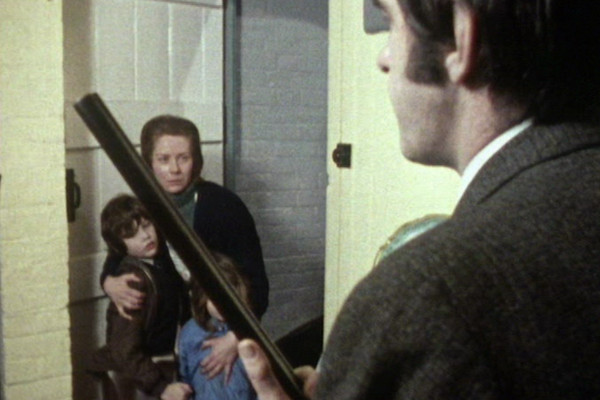
One of the dangers of ranking a series on a once-only viewing is that certain episodes may become overrated due to where they appear. In the run of existing episodes, then Hair Trigger follows five below-par entries, and so may appear better than it actually is due to placement alone. Still, while somewhat old-fashioned even by the usual standards of the series ("my dear..." is said more than once) this is a psychologically intriguing entry.
As is very common with a lot of season three episodes, Doomwatch's involvement is peripheral at best. Featuring mind controlling experiments on violent prisoners, it was based on real life research. Ice Warriors creator Brian Hayles gives a more dramatic script than his earlier, languid The Iron Doctor, though it's debatable whether a tale of a manhunt and hostage situation is really the kind of case that Doomwatch should be involved in. At the forefront is Quist's wife, the psychiatrist Dr. Anne Tarrant... while the subject matter of the other season three episode (leaded petrol) is now behind us, the subject of adequate mental health care is, sadly, still very much with us today.
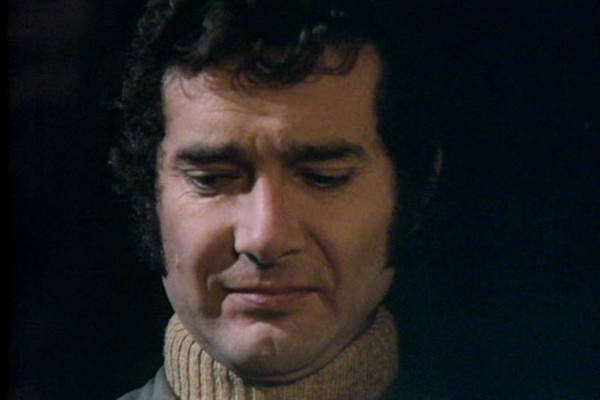
When a series is the product of many different writers, it can be hard to maintain a consistent tone. The Doomwatch crew are a group of people who generally don't get along, and prefer blazing rows in place of companionship... not quite Blake's 7 season three in terms of mutual dislike, but close. Here, however, the sole script by Elwyn Jones, while fine, gives us a team who are far more at ease with each other, even cracking regular jokes... though Quist's revelation of "I am circumsized, though" has to go into a file of things you didn't need to know.
With a Welsh writer, we're allowed to see a Welsh community without the stereotyping so common in this period, even if only one of the actors is actually Welsh. Yet what causes this one to rate so highly is how unique and left-field the plot actually is. When a business uses hormones to aid fish growth, it's discovered that workers handling the fish are becoming impotent. This, by itself, would be a strange enough plot, but there's a subplot involved whereby the only sexual passion the workers can achieve is when they're watching an illegal cock fight. Said cock fight, while staged, looks reasonably realistic thanks to nice camerawork and edits, and Ridge's reactions (as pictured) help sell the effect.
There is, as there often is, a kind of "and I'd've gotten away with it too, if it wasn't for you pesky Doomwatch kids!" feel to the whole thing, and Quist shocks the factory so much with his revelations that he's able to say stuff on video and get people to react on film. There's a darker edge to Quist here, though it's not made entirely clear due to the poor editing: one of the factory workers drags the manager into the hormones, killing him, and Quist denies having seen anything. Lastly, it's a very literate episode: Quist's joke is a reference to the Bible, specifically Deuteronomy 10:16, after a minister has called him "stiff necked": "So circumcise your heart, and stiffen your neck no longer."
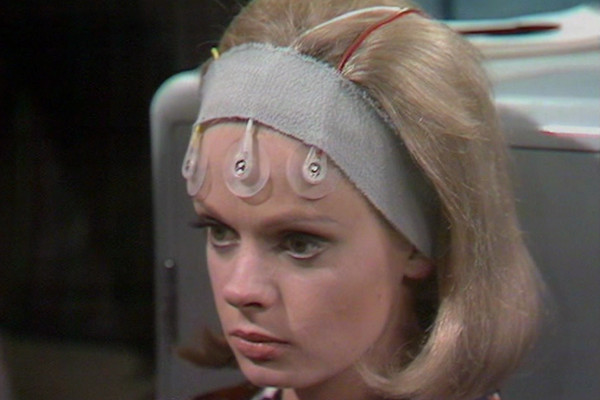
Simon Oates is, perhaps, the most troubling of the regulars when seen through modern eyes. A real-life womaniser with an espionage background, he was allowed to bring these things in to the character of John Ridge, and therefore gives us the series' Jason King. Some of the costumes he wears are outrageous - the season two opener saw him wear a dog collar for a £50 bet - but the quality of Oates's performance helps it to work. It perhaps also doesn't help that the actor was 6'4, towering eight inches over Robert Powell, and having to regularly lean on filing cabinets just to fit comfortably into shot.
Ridge leads most of the study here into an intriguing plot - a special drug, planted in chocolate, that causes people to be more subseptible to subliminal advertising. It's a patronising script, in many ways, calling upon characters to not understand even basic facts in order to have said facts explained to them. As the episode is one of the few to strongly feature Pat Hunnisett, as pictured, then this is often done at the detriment of her character. It's little surprise that she left at the end of the season, her last role in television, as it was such a demeaning part.
Although the series is light on incidental music, regular composer Max Harris is distracting here, and there's some directorial issues, such as the then-fashionable use of zoom ins, down to the camera going out of focus when Hunnisett is ill, despite the fact that it's being shot from the POV of the viewer, not Pat. There's also the small amusement of Quist throwing a plastic container in anger, which makes him look like a small child throwing a tantrum... it would have been far more effective if they'd used sugar glass.
Despite such detractions, the episode would have reached the higher levels of this ranking just on the innovation of its plot, and some of the more "out there" choices, such as the opening with the bizarre dress and percussion music of the girls handing out chocolate. What elevates the episode to the higher level is an ending where Ridge, interrogating suspects, is wilfully led to believe that Pat has died, just to enforce his sense of purpose on the case. When it's all over, Quist reveals that he'd deliberately made sure that he'd received a call informing him of Pat's "death", even though she was safe and well all along. "You bastard!" snaps Ridge.
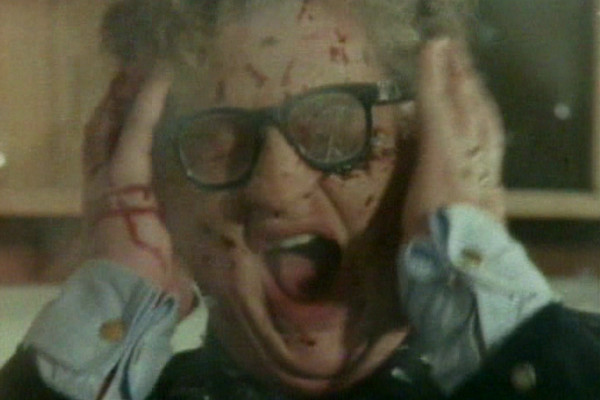
On a purely objective level, there's no real justification for this episode reaching so high in this ranking. It's far from the best episode in terms of writing, acting or concept. However, what makes it rank so highly is that it's an unintentional comic tour-de-force..
Throughout the 70s "Public Information Films" would be shown on television, warning children of various dangers. Often, because of the stagy acting of the children involved, combined with the melodramatic depiction of dangers, these would produce laughter as opposed to fear. While some entries like Lonely Water were genuinely eerie, others like Play Safe: Frisbee would be more perversely comic, which was far from the original intention. The opening to this episode, featuring a child with smashed glasses, blown up in a science experiment, screaming with exaggerated intent, mines a similar layer of unintentional black comedy.
It doesn't end there, as Bernard Hepton plays the Yorkshire-accented father of one of the boys involved, a Pythonesque creation who slams down phones with a "bastard!" and utters inexplicable lines like "if schools are going to bring in psychological and biological big brothers, to sit in genetic judgement on our children..." Hepton's incessant intensity in the face of such a ludicrous script is hilarious, as is the sight of a 20-year-old Sally Thomsett playing a 13-year-old schoolgirl in pigtails.
As the central character, then Barry Stokes lacks true gravitas as the boy who finds he has an extra Y chromosome. In another episode this lack of true acting depth would sink it, but here his slightly wooden cries of "I'm too tall! Too tall! I want to die!" add further to the amusement within. It all ends with another sermonising speech from Quist, while Olaf Pooley (who has contrivedly been conducting Y chromosome experiments at the exact same time as the dad seeks Doomwatch's help) looks on in horror. On a purely objective level, this may well be the worst episode of Doomwatch ever made. Yet as an unintentional comedy, it's arguably the best.
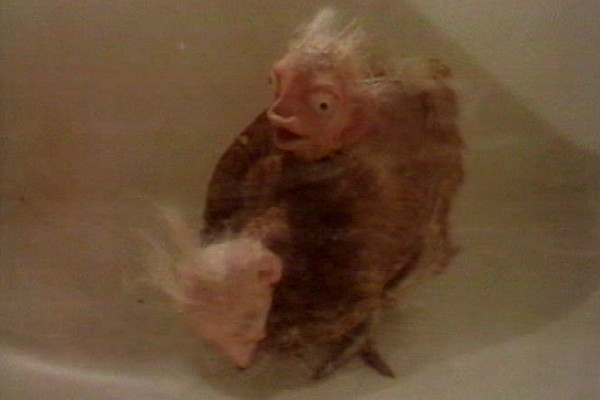
Genuine drama is mined from the series here, as the aftermath of Toby Wren's death is explored. Although the cataclysmic Survival Code no longer exists in the BBC archives, the final moments were included as part of the pre-credits sequence here. Many series, when continuing after a lead character has departed, tend to bring in proxy replacements (or even poxy replacements) that fulfil the same basic plot functions and dynamics within the show. While newcomer Geoff Hardcastle is the new "young man" of the show, this is subverted here as Ridge is disgusted by Quist's attempt to replace Toby.
John Nolan made a promising start as Hardcastle, though, despite appearing in nine more episodes, he became very much a secondary character, given little to do in deference to the others. A talented actor who appeared in other programmes covered on this site (The Prisoner and The Sweeney), when he was approaching his sixties he played a role in a "no budget" film, Following, as a favour to his young nephew who wanted to become a director. His nephew, Christopher, went on to repay the favour when he got more successful in the industry, giving John roles in some larger movies: Batman Begins, Dunkirk and The Dark Knight Rises.
Also new to the series here is Vivien Sherrard as replacement secretary Barbara Mason. While she would appear in twenty episodes, it was a far less prominent role than Wendy Hall's, which did at least mean she got to avoid most of Ridge's sexual harassment. Then there's the first appearance of Dr. Anne Tarrant, who Quist sees for counselling, and later asks for her number. While this subplot would appear to go unreferenced, the thread was picked up with season three, where, as we've seen, she was brought back as his wife.
Despite its status here as the greatest of the existing broadcast episodes, You Killed Toby Wren again suffers from the vast gulf between budget and ideas. John Ridge investigates human-animal hybrid experimentation, the implications of which are horrific. Sadly, despite Oates' most dedicated performance, and the descriptive dialogue, what we see is what is unfortunately captured above: a chicken with two rubber heads stuck on it. With animal welfare standards not being as strict at the time, the chicken is clearly distressed and trying to shake off its replacement "head", though far more docile is the dog in the next cage wearing a bald cap. Unfortunately today, this is the legacy of Doomwatch in some of its best instalments... big ideas, poor execution. What should produce horror instead produces hilarity, and ensures that the programme's only appearances in nostalgia "clips" shows are there purely for easy derision. It's a great shame, because the series deserved better.
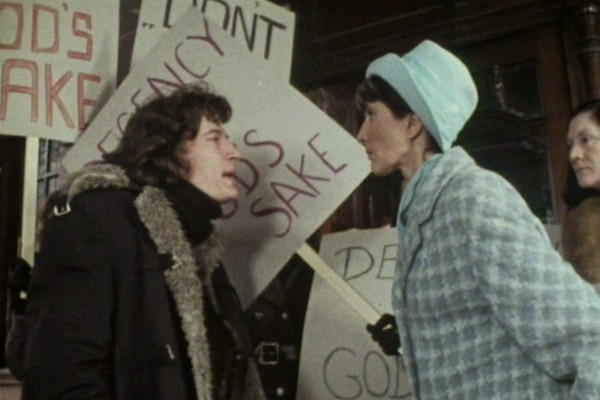
Sex And Violence asks the question... what if Doomwatch wasn't a drama series, but a scathing satire of modern societal mores? The Goodies had beaten them to it by seven months, with the episode Gender Education (also possessing the alternate title of "Sex And Violence") casting Beryl Reid as the puritanical Mrs. Desiree Carthorse. This more than worthy spiritual follow-up has June Brown as "Mrs. Catchpole", while Noel Dyson plays moral campaigner Angela Cressy, giving the instalment two Mary Whitehouse analogues for the price of one. Adding to this - a parody of then-current investigations into pornography in British society - are substitutes for the real-life participants, including Lord Longford and Cliff Richard. The script certainly isn't above some sillier jokes, such as Christopher Chittell's Cliff-mimicking pop star going by the name of "Dick Burns".
It's a brilliantly savage satire by one-time writer Stuart Douglass, including the observation by a right-wing extremist that "If you have created a society in which a naked couple cavorting on a public stage is more shocking than a million on the dole, a hundred thousand homeless, or half a million dead in Pakistan, don't blame me for taking advantage!" Amusingly "soft porn" footage had to be specially filmed for the serial, as Soho dealers morally objected to such material being broadcast on BBC1. Far more serious is the use of actual execution footage from Nigeria, which still shocks today.
A huge, legitimate criticism of the story is that it's barely a Doomwatch episode at all. The lead is Quist's wife, Dr. Anne Tarrant, while Quist does little more than watch the various debates take place. The episode opens with Quist insisting that "it's not my area... of investigation" and ends with him asking "What's Doomwatch doing in this mess? [...] I still can't get to terms with my brief." As a piece of television it's compelling, daring and has a lot to say. As a piece of the series Doomwatch it's far less worthwhile.
Ironically, the serial was pulled from broadcast due to its controversial subject matter, where it would have been aired fifth in the third season. It was finally released onto DVD in April 2016, though its inclusion still only brings the final season up to twelve episodes... the planned season closer, "I Never Promised You A Rose Garden" AKA "The Devil's Demolition" by Wolf Rilla, was scrapped before it was made due to undisclosed reasons. Of the thirteen directors who worked on the programme, Darrol Blake was the most prolific, directing half a dozen, including Sex And Violence. The scrapped episode was due to be his seventh.